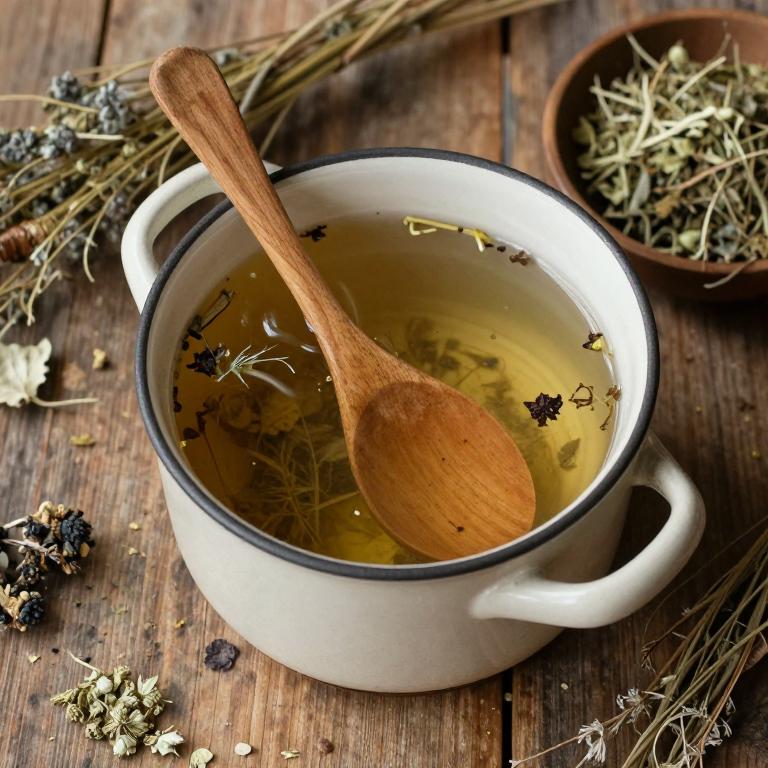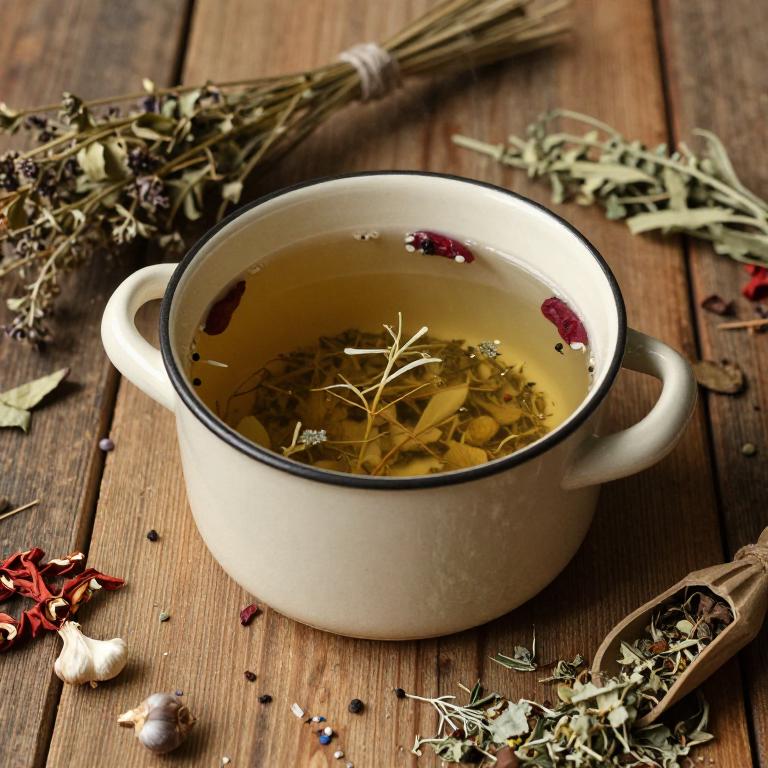10 Best Herbal Decoctions For Snoring

Herbal decoctions have been traditionally used to alleviate snoring by addressing underlying causes such as nasal congestion, throat relaxation, and respiratory issues.
Common herbs like chamomile, valerian root, and licorice are often included for their calming and anti-inflammatory properties. These decoctions work by soothing the throat, reducing mucus production, and promoting better airway function during sleep. To prepare, the herbs are typically simmered in water for several minutes, then strained and consumed before bedtime.
While generally safe, it is advisable to consult a healthcare provider before using herbal remedies, especially for those with existing medical conditions or taking other medications.
Table of Contents
- 1. Valerian (Valeriana officinalis)
- 2. Ginger (Zingiber officinale)
- 3. Chamomile (Matricaria chamomilla)
- 4. Licorice (Glycyrrhiza glabra)
- 5. Black pepper (Piper nigrum)
- 6. Echinacea (Echinacea purpurea)
- 7. Stinging nettle (Urtica dioica)
- 8. Rosemary (Rosmarinus officinalis)
- 9. English lavender (Lavandula angustifolia)
- 10. Ceylon cinnamon (Cinnamomum verum)
1. Valerian (Valeriana officinalis)

Valeriana officinalis, commonly known as valerian, has been traditionally used for its calming effects and is sometimes recommended as a natural remedy for snoring.
Herbal decoctions made from valerian root are believed to help reduce anxiety and promote relaxation, which may indirectly alleviate snoring by improving sleep quality and reducing throat muscle tension. While scientific evidence supporting its effectiveness for snoring is limited, some studies suggest that valerian may help regulate sleep patterns and reduce nighttime awakenings. When prepared as a decoction, valerian root is typically boiled in water and consumed as a tea, often combined with other herbs like lemon balm or chamomile for enhanced effects.
It is important to consult a healthcare provider before using valerian, especially for individuals with existing medical conditions or those taking other medications.
2. Ginger (Zingiber officinale)

Zingiber officinale, commonly known as ginger, has been traditionally used in herbal medicine for its various therapeutic properties, including its potential to reduce snoring.
Ginger contains bioactive compounds such as gingerol and shogaol, which may help relax the muscles in the throat and reduce inflammation, thereby improving airflow during sleep. A ginger herbal decoction can be prepared by boiling fresh ginger root in water and consuming it as a warm beverage, often recommended before bedtime. Some studies suggest that the anti-inflammatory and bronchodilator effects of ginger may contribute to alleviating snoring symptoms.
However, while anecdotal evidence supports its use, more clinical research is needed to confirm its efficacy as a treatment for snoring.
3. Chamomile (Matricaria chamomilla)

Matricaria chamomilla, commonly known as German chamomile, has been traditionally used for its calming and anti-inflammatory properties.
Herbal decoctions made from chamomile flowers may help reduce snoring by relaxing the muscles in the throat and reducing inflammation in the airways. The essential oils in chamomile, such as bisabolol and chamazulene, possess sedative and antispasmodic effects that can ease respiratory discomfort. Some studies suggest that chamomile tea consumed before bedtime may improve sleep quality and decrease nighttime snoring.
However, while anecdotal evidence supports its use, more scientific research is needed to confirm its efficacy in treating snoring as a standalone remedy.
4. Licorice (Glycyrrhiza glabra)

Glycyrrhiza glabra, commonly known as licorice root, has been traditionally used in herbal medicine for its soothing and anti-inflammatory properties.
When prepared as a decoction, licorice root can help reduce throat irritation and swelling, which may contribute to snoring by relaxing the upper airway tissues. Some studies suggest that the active compounds in licorice, such as glycyrrhizin, may have mild bronchodilatory effects, potentially improving airflow and reducing nighttime breathing disturbances. However, long-term use of licorice decoctions should be approached with caution due to potential side effects like hypertension and fluid retention.
While licorice root may offer some relief for snoring, it is advisable to consult a healthcare professional before using it as a treatment for persistent or severe snoring issues.
5. Black pepper (Piper nigrum)

Piper nigrum, commonly known as black pepper, has been traditionally used in herbal medicine for its potential respiratory benefits.
Herbal decoctions made from black pepper are believed to help reduce snoring by improving airway通畅 and reducing inflammation in the throat. The active compound, piperine, may enhance the effectiveness of other herbs when combined in a decoction. These decoctions are often prepared by boiling the dried peppercorns in water for several minutes.
While some anecdotal evidence suggests that black pepper decoctions may alleviate snoring, more scientific research is needed to confirm their efficacy and safety.
6. Echinacea (Echinacea purpurea)

Echinacea purpurea, commonly known as purple coneflower, is a traditional herbal remedy often used for its immune-boosting properties.
While primarily recognized for its role in reducing cold symptoms, some studies suggest that echinacea may also have potential benefits for respiratory health. Herbal decoctions made from echinacea roots and flowers are believed to help reduce inflammation in the airways, which could potentially alleviate snoring by improving airflow. However, more research is needed to confirm its effectiveness specifically for snoring.
As with any herbal remedy, it is advisable to consult a healthcare professional before use, especially for individuals with existing medical conditions or those taking other medications.
7. Stinging nettle (Urtica dioica)

Urtica dioica, commonly known as stinging nettle, has been traditionally used in herbal medicine for its potential health benefits.
While it is not a primary treatment for snoring, some studies suggest that its anti-inflammatory properties may help reduce throat irritation and swelling, which can contribute to snoring. Herbal decoctions made from stinging nettle can be prepared by steeping the dried leaves in hot water, and some individuals use them as part of a holistic approach to improving respiratory health. However, there is limited scientific evidence directly linking urtica dioica decoctions to the reduction of snoring, and it is advisable to consult a healthcare professional before using it as a treatment.
Overall, while stinging nettle may offer general health benefits, it should not replace conventional medical advice or treatments for snoring.
8. Rosemary (Rosmarinus officinalis)

Rosmarinus officinalis, commonly known as rosemary, has been traditionally used in herbal medicine for its potential to alleviate symptoms of snoring.
Herbal decoctions made from rosemary leaves are believed to improve respiratory function and reduce nasal congestion, which can contribute to quieter breathing during sleep. The essential oils in rosemary, such as camphor and pinene, may help to stimulate airflow and reduce the relaxation of throat muscles that often lead to snoring. Some studies suggest that inhaling rosemary steam or consuming rosemary tea may help in reducing the frequency and intensity of snoring.
However, while anecdotal evidence supports its use, more scientific research is needed to fully confirm its effectiveness as a natural remedy for snoring.
9. English lavender (Lavandula angustifolia)

Lavandula angustifolia, commonly known as English lavender, has been traditionally used in herbal medicine for its calming and soothing properties.
Herbal decoctions made from lavender are believed to help reduce snoring by relaxing the muscles in the throat and promoting better respiratory function. These decoctions are often prepared by steeping dried lavender flowers in hot water, creating a calming tea that can be consumed before bedtime. Some studies suggest that the essential oils in lavender may have a mild sedative effect, which can aid in improving sleep quality and reducing nighttime breathing disturbances.
While more research is needed, lavender herbal decoctions are considered a natural and complementary approach for individuals seeking relief from snoring.
10. Ceylon cinnamon (Cinnamomum verum)

Cinnamomum verum, commonly known as true cinnamon, has been traditionally used in herbal medicine for its potential benefits in reducing snoring.
Herbal decoctions made from cinnamon bark are believed to help soothe the respiratory tract and reduce inflammation in the airways, which may contribute to less frequent snoring. The warming properties of cinnamon may also help to clear nasal congestion, improving breathing during sleep. Some studies suggest that the essential oils in cinnamon may have mild sedative effects that could promote deeper, more regular breathing.
However, while anecdotal evidence supports its use, more scientific research is needed to fully confirm its efficacy for treating snoring.